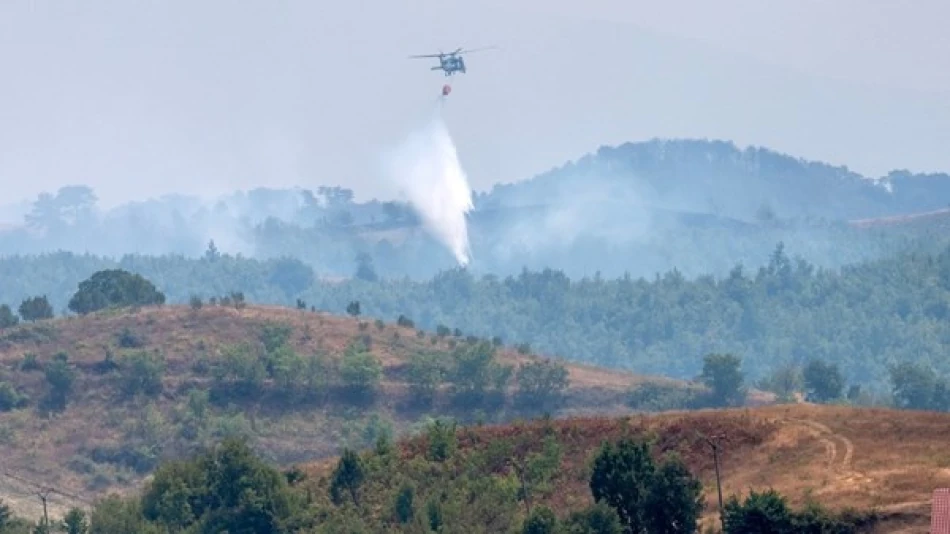
Emirati Rescue Team Concludes Efforts to Extinguish Albania Forest Fires
UAE's Firefighting Mission in Albania Showcases Growing Middle Eastern Role in Global Crisis Response
The United Arab Emirates has concluded a multi-week firefighting operation in Albania, deploying specialized aircraft and personnel to combat devastating forest fires across multiple regions. The mission, which involved 700 water drops totaling 1,300 tons of firefighting materials across 28 aerial sorties, signals the UAE's expanding role as a regional humanitarian power and reflects deeper geopolitical shifts in international disaster response.
Scale and Impact of the Operation
The UAE rescue team launched operations on August 12, targeting fire-ravaged areas including the forests of Gramsh, Ballsh, and the coastal Vlora region. According to Defense Ministry spokesperson Mohamed Al-Sharif, the mission demonstrated the UAE's capacity to project humanitarian assistance far beyond its immediate neighborhood, requiring significant logistical coordination and specialized equipment transport across continents.
The operation's scope—involving nearly three weeks of continuous aerial firefighting—represents one of the UAE's most substantial international disaster response deployments to date. The mission was executed under direct orders from President Sheikh Mohammed bin Zayed Al Nahyan, underscoring the strategic importance the UAE places on such humanitarian interventions.
Strategic Implications for UAE Foreign Policy
Soft Power Projection
This Albanian mission fits within the UAE's broader strategy of leveraging humanitarian assistance as a tool of soft power diplomacy. Similar to how countries like Turkey have used disaster response to strengthen bilateral relationships, the UAE is positioning itself as a reliable partner for European nations facing climate-related emergencies.
The timing is particularly significant as Europe grapples with increasingly severe wildfire seasons. By demonstrating rapid-response capabilities in the Balkans, the UAE is effectively marketing its services to a region that may require similar assistance in future fire seasons.
Bilateral Relations Enhancement
The mission strengthens UAE-Albania ties at a time when both countries are exploring expanded economic cooperation. Albania, as a NATO member and EU candidate country, offers the UAE a potential gateway for deeper engagement with European institutions and markets.
Regional Context and Comparisons
The UAE's Albanian deployment mirrors similar international firefighting assistance programs, but with notable differences. While countries like Israel and Greece typically provide mutual aid within Mediterranean partnerships, the UAE's involvement represents a more distant, resource-intensive commitment that suggests longer-term strategic thinking.
This approach parallels Qatar's humanitarian diplomacy model, where Gulf states leverage their aviation capabilities and financial resources to build influence in regions traditionally outside their sphere of influence. However, the UAE's focus on operational deployment rather than purely financial assistance demonstrates a more hands-on approach to international engagement.
Implications for Future Crisis Response
The Albanian government's formal recognition ceremony, attended by Prime Minister Edi Rama and senior military leaders, provides the UAE with valuable diplomatic capital. Such high-level acknowledgment creates precedents for future cooperation and potentially opens doors for UAE involvement in other European security initiatives.
For international disaster response frameworks, the UAE's successful operation demonstrates how middle powers can fill capability gaps in regional crisis response. As climate change intensifies wildfire risks across Southern Europe, the UAE's proven firefighting capacity positions it as a valuable partner for European nations whose domestic resources may be stretched thin during peak fire seasons.
The mission's success also validates the UAE's investment in specialized emergency response capabilities, suggesting that humanitarian diplomacy will remain a key component of Emirati foreign policy strategy in the coming years.
Most Viewed News

 Layla Al Mansoori
Layla Al Mansoori






